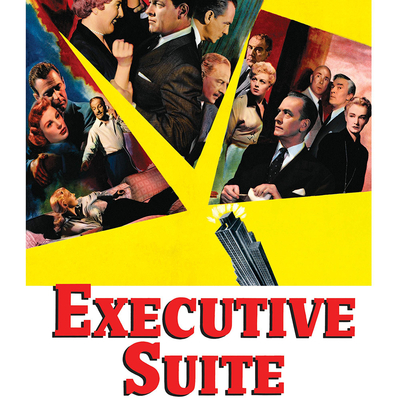In the commentary track he recorded for the 2007 DVD reissue of Executive Suite, director Oliver Stone tells us that there are so few movies about the world of business that he ended up going back to this 1954 Robert Wise picture when he was looking for inspiration for his 1987 film Wall Street.
Wise's film was a hit when it was released and netted four Oscar nominations, but it is as obscure now as when Stone studied it for his own picture. As crucial as finance and management are to the working of capitalism, the business picture remains a subgenre, with only a few films considered classics (Stone's picture, The Big Short, perhaps The Wolf of Wall Street and The Social Network, Citizen Kane at a stretch. But most movies about money are really about finance and the markets and not boardroom politics.)
Any list of business pictures you'll find online is full of documentaries, most of them taking a polemically dim view of American capitalism – Michael Moore films like Roger & Me, The Big One and Capitalism: A Love Story, alongside The Corporation, Inside Job and Enron: The Smartest Guys in the Room. It would be safe to assume that the only people making movies about business are people who profess to hate it.
And if you believe Stone, the failure of American capitalism begins with the story told by Executive Suite. "It begins here," he says in his commentary. "This is the germ. The Fredric Marches of the world are winning."
March plays Loren Shaw, the bad guy in the film – a vice president and controller at Tredway Furniture, a major manufacturer based in Pennsylvania. But before we meet him we're introduced to Avery Bullard, president of the company, while he's visiting the company's money people in New York City and just before he drops dead of a stroke on the sidewalk just down the street from the New York Stock Exchange. Shaw and Bullard, the voiceover narration tells us after the credits roll, are men who inhabit a rarified world, "up there close to the clouds."
We actually never really meet Bullard: in a showy bit of camera work director Wise chooses to show us the world as Bullard sees it, with a first-person point-of-view camera taking us from the office of Steigel, a brokerage firm, down the elevator to the telegraph office in the lobby where he sends a wire calling a board meeting that evening to the taxicab he tries to hail before falling to the kerb.
In his commentary Stone tells us that the voiceover is by Edward R. Murrow; it was actually Chet Huntley. He also says that Wise copied the first-person camera from a Bogart film, Dead Reckoning, when it was actually Dark Passage. With mistakes like this up front, you can't help but wonder just what else Stone gets wrong.
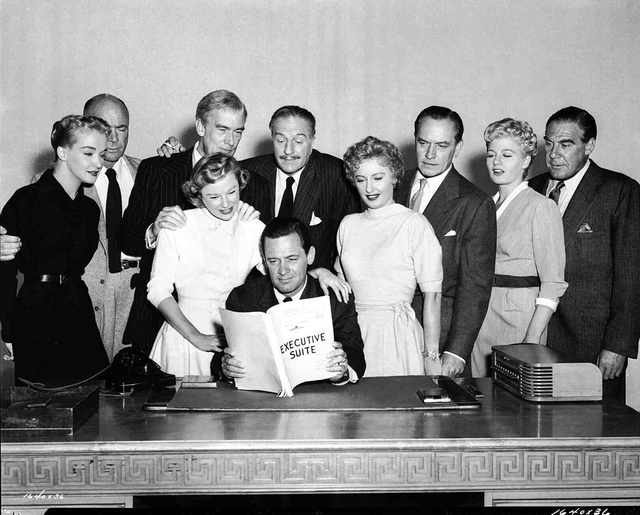
What Stone gets right is noting that Executive Suite begins with two crimes. The first is Bullard's wallet getting stolen before he's carried away in the ambulance; the absence of ID on the body gets it tagged as a John Doe at the morgue. (We never see the thief's face, but we do see his two-tone brogues, marking him as a lower-class chancer.)
The second crime is committed by Caswell (Louis Calhern), a paper-rich but cash-poor speculator and member of the Tredway board who was in Steigel's office for the meeting, and who sees Bullard's body being taken away from their office window. He immediately issues an order to short sell his stock in the company through a third party, planning to buy it back when the market reopens on Monday at a discount after the bad news has broken.
The next scenes follow Bullard's telegram to his company's art deco office tower in Millburgh, Pennsylvania. (The Pennsylvania Power & Light building in Allentown stood in for Tredway headquarters.) News of the meeting is carried by his loyal secretary Erica (Nina Foch, who got a supporting actress nomination for the role) to the other members of the board, starting with vice president and treasurer Frederick Alderson, his loyal number two, played by Walter Pidgeon.
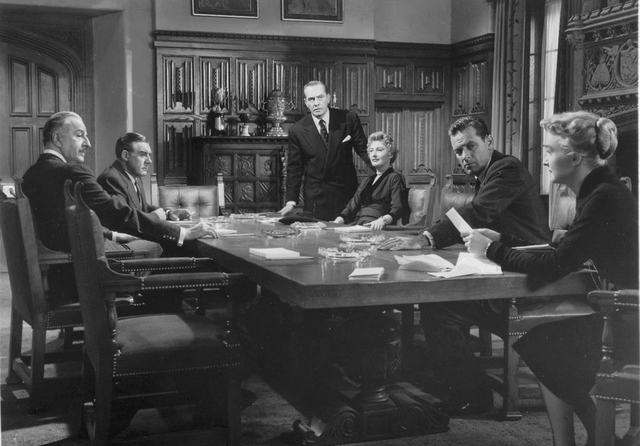
The ensemble cast of Executive Suite was star-studded. Besides March and Pidgeon, there's V.P. for manufacturing Grimm (Dean Jagger), V.P. of sales Dudley (Paul Douglas) and William Holden as Don Walling, vice-president of design and development and the youngest man on the board. The final board member is Julia Tredway, daughter of the company's late founder, played by Barbara Stanwyck as a fragile, suicidal neurotic.
All these people will be players in the power struggle that occurs over the next twenty-four hours, their status and vision for the company all set in place on the game board by the absent Bullard, who had neglected to choose a successor before dying – a king who left his generals to fight over his empire.
First off the starting block is the efficient and passive-aggressive Shaw, who takes the liberty of organizing both the crisis management public relations campaign and the funeral, sidelining Alderson, who realizes he doesn't stand a chance against Shaw but puts all his energy into organizing a majority of board votes behind a more palatable successor.
The picture is definitely a period piece. The war for succession at Tredway Furniture (even the name suggests a time closer to the industrial revolution than conglomerates and globalized supply chains) does not involve a hostile takeover, asset-stripping, proxy battles or shareholder activism. It might be publicly traded, but the battle for the company is a private one, and even though it's based on a bestselling 1951 novel by Cameron Hawley, it might as well have been a stage drama, so neatly does it play out in no more than two or three major settings.
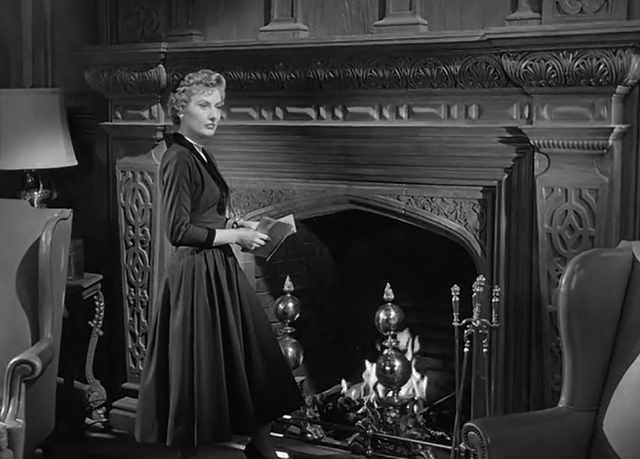
This is embodied in the design for Bullard's suite of offices at the top of the Tredway Tower. The building is a classic deco skyscraper with setbacks and soaring stonework, but Bullard's office, complete with fireplace and adjacent boardroom, is all neo-gothic and carved woodwork, full of details that wouldn't be out of place in a palace or a cathedral, all presided over by Foch's Erica, the most stalwart guardian of Bullard's legacy.
The executive floor below is the usual warren of small offices off a central corridor, with even smaller anterooms for secretaries. There are no glass-walled corner offices looking out on other skyscrapers and into vast open-plan floors, full of junior execs who can't look up from their desks without glimpsing their superiors and the longed-for next step on the corporate ladder. These people might be at work somewhere in Tredway Tower, but in 1954 they're still on some lower floor, out of sight and out of mind.
This is a world of clacking typewriters, carbon paper, Gestetner machines, Dictaphones, telephone switchboards, vast and well-stocked stationary storerooms, the office boy and the telegram. One untouched by IBM and Xerox, though not for very much longer. It's no wonder Oliver Stone recalled Executive Suite as coming from a pivotal moment in business history. (Though it came out only two years later, The Solid Gold Cadillac starring Judy Holliday and Paul Douglas is a more modern business picture, as is Desk Set from 1957)
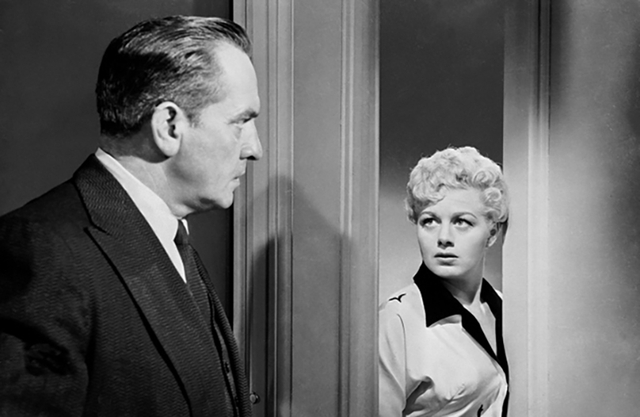
It might be dated – and it might be because it's dated – but the story is full of well-defined characters, wonderfully acted. It was screenwriter Ernest Lehman's first picture, but he'd co-write Sabrina with Billy Wilder and Samuel Taylor the same year, before going on to Somebody Up There Likes Me, The King & I, Sweet Smell of Success, North by Northwest, From the Terrace, West Side Story, The Sound of Music, Who's Afraid of Virginia Woolf?, Family Plot and Black Sunday. It's a great resumé, notably free of stinkers.
The primary conflict in the Tredway boardroom is generational. Bullard's right-hand man Alderson is told by his wife that he – hell, they – deserve payback for the years they put in at the company, but he realizes too late that he has spent most of his life in service to the man as much as the company and has little support with Bullard's passing.
Grimm works well with Holden's Walling but does a poor job hiding his resentment at the younger man's embrace of new technologies that threaten to sweep away everything he's literally built on the shop floors. In any case he was planning on retiring before Bullard's death and has emotionally disengaged from his work in a way no one else at Tredway does.
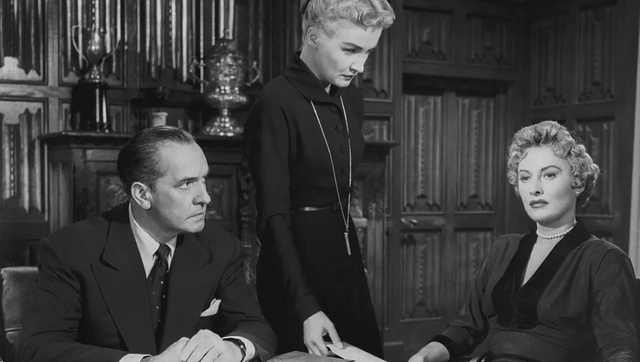
March's Shaw doesn't look to our eyes like a young man, but he embodies modern business trends as much as Walling, albeit from the perspective of the number-crunching, bottom line management model that puts shareholder value before anything else. He's good at his job but has no friends at the office; at one point his outsider status is summed up as a class thing – a product of the humble background he tries so hard to hide and his "night school CPA."
(It's hard not to notice how old these men look relative to anyone their age today; we don't see his face, but Bullard was supposed to be just 56 when he died on that Wall Street sidewalk, and we're meant to assume that he was from the same generation as Grimm and Alderson.)
The only man who seems to rise above the free-floating enmity is Douglas' Dudley. He's a born salesman – a back-slapping, golf playing, barrel-chested, hard drinking frequent flier, and when Alderson can't and Walling won't put their hat in the ring, they decide to nominate Dudley as the new CEO, if only as an obstacle to Shaw taking the job.
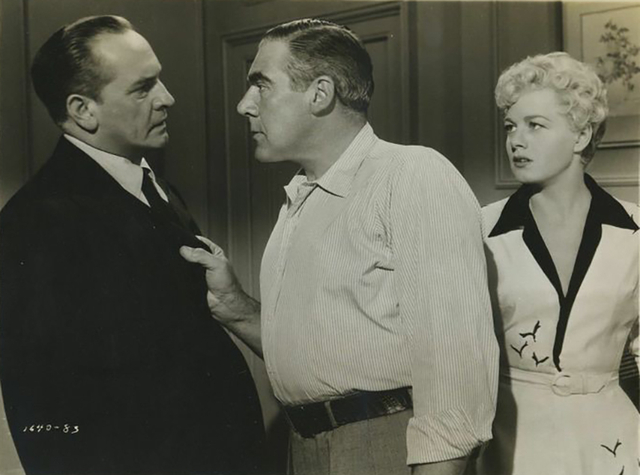
But Dudley has an Achilles' heel in his bad marriage and the affair he's having with his secretary, Eva (Shelley Winters). Shaw finds out about it and blackmails Dudley into backing his bid, during a scene when he coldly barges in on the couple in Eva's apartment, humiliating the young woman and forcing her to end it with Dudley – a fantastically-written scene that does credit to Lehman, Douglas and Winters.
Which forces Walling to reconsider Alderson's suggestion that he try to beat Shaw. Holden's character is probably the most distinctive one in the whole picture, if only because he's both the most unrealistic and the most archetypical.
We're meant to notice the difference between the wood-paneled gothic sepulchre Bullard has left empty at the top of the Tredway Tower and the home Walling shares with his wife Mary (June Allyson) and his young son. It's a modernist vision of fieldstone and shoji screens – sleek and open and airy, right down to Walling's lofty home office, as tasteful today as it would have been in 1954.
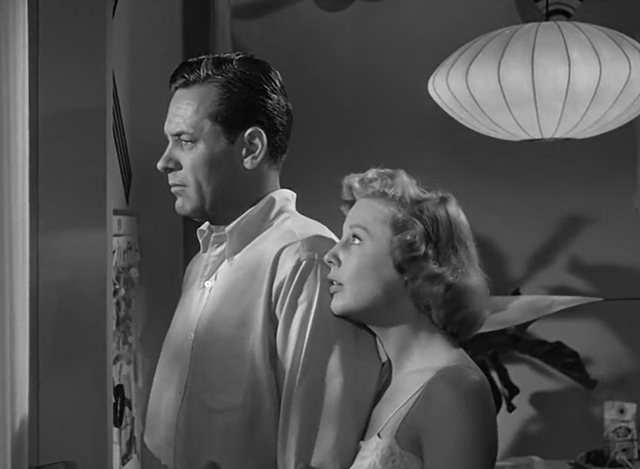
We're also meant to understand that Walling has an artist's soul, and that he was promised considerable leeway in bringing Tredway's product line into the second half of the century – a promise that was stymied by Bullard's growing inattentiveness to day-to-day affairs at the company, and Shaw's relentless cost-cutting.
Mary wants him to leave, not just for his own happiness but to potentially save their marriage, whose deterioration she can see in at least the distant future. (There's a whole subtext in the film about the sacrifices women make when men are consumed with business; it's even more explicit in Hawley's novel. Stanwyck's whole character suffers from the burden of being the daughter of one great man of business while being in love with another.)
Walling is also the only board member we see on the shop floor, working with insufficient resources at one of Tredway's factories trying to pioneer a new process in injection moulding.
Which means that Walling is the only one who understands how crucial it is that Tredway continues to grow and innovate, if only to keep the workers he sees every day both happy and employed. It might have been accidental, but Hawley and Lehman make Holden's Walling the embodiment of "People's Capitalism," a loose doctrine invented by the Ad Council and endorsed by President Eisenhower, to counter the Soviet vision of a worker's paradise.
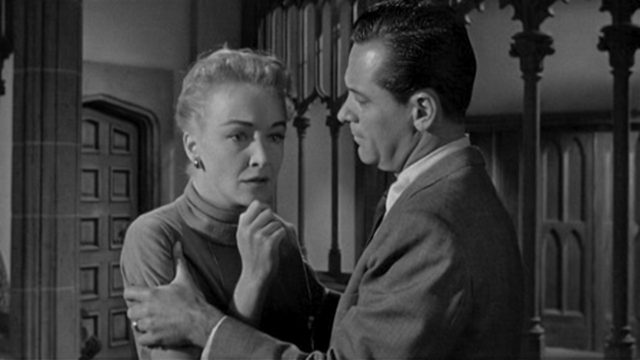
This is the sort of thing that people refer to when they talk about the "good old days" of the postwar economic miracle – the Great that U.S. voters were told to Make America Again. As a concept invented by an ad man it's hard to define with any rigour, but it can be summed up as the Soviet Union being a classless society in theory while America was one in fact as it can actually deliver the material prosperity and social progress both societies called ideal.
There's doesn't seem to be a consensus any more as to just what was so great and unique about the postwar boom in the West, or even why it happened. All we know is that reviving it has proved far more difficult than anyone imagined.
What we do know is that the writing was on the wall by the '70s. As Alan Greenspan and Adrian Wooldridge would write in Capitalism in America:
"The 1970s was the decade when America finally had to grapple with the fact that it was losing its leadership in an ever-widening range of industries. Though the best American companies such as General Electric and Pfizer powered ahead, a striking number treaded water: they had succeeded during the long postwar boom not because they had any particular merits, but because Europe and Japan were still recovering from the devastation of the Second World War, and they collapsed at the first sniff of competition."
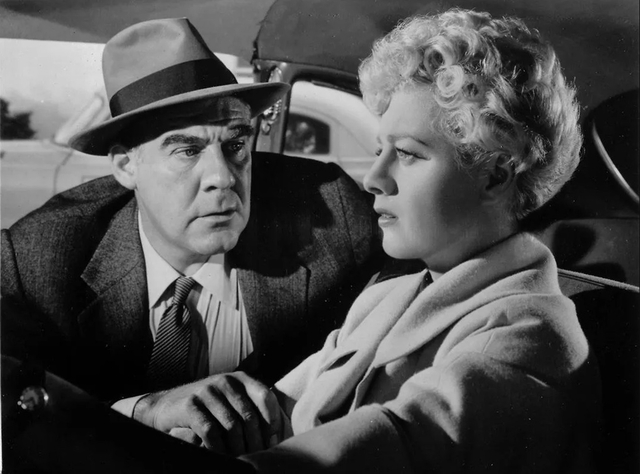
Which might be true at a glance, though others are sure that what did the "good old days" in not only pre-dated the '50s, but persists today, in a society that is presumed to have been utterly transformed by a radical transformation in the '60s. Or as an article in The American Interest would have it:
"The culture of the 1950s remains foundational because it was actually not a conservative bourgeois culture; it was the destructor of that culture. It was a culture of other-directed people who used external cues to shape their personalities, rather than of inner-directed people drawing from a character implanted early within life...The 1960s mostly built on the blueprint of the previous era by expanding the variety of peer groups, albeit with same tendency toward 'groupthink' It is no surprise that in a hip Manhattan bar filled with social rebels almost everyone wears the same styles of clothes, or that in a deep blue-state neighborhood most people share the same opinions. Despite the iconic status of 'diversity,' Americans today are at least as conformist as they ever were."
Can you see why this is all so confusing?
In the end Shaw is defeated when Walling, at the last possible moment, delivers an inspirational speech about what a success Tredway can be if it embraces innovation and core values without sacrificing everything at the altar of the bottom line. It's the sort of rousing speech that business movies funnel their plots into, like Gordon Gekko's "Greed is Good" in Stone's Wall Street, or the dueling visions of American capitalism espoused by Gregory Peck and Danny DeVito in Other People's Money.
But it doesn't matter since hindsight is 20-20 and we know that, as Stone said in his commentary, Frederic March's Shaw wins in the end. Even if Walling got his way and had Tredway produce the lines of well-made, modern furniture we see in his house and on the framed wall of award-winning designs by the time clock at the factory, we all know that they won't survive the next two decades.
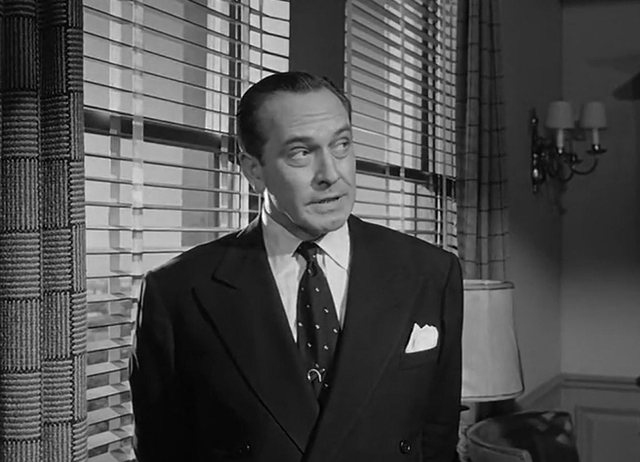
Because Shaw's creed of shareholder value, codified by Milton Friedman and upheld by the rise of investment banks, would force Tredway to produce cheaper products, go offshore for labour or shut down altogether. You hope that the Walling's marriage will survive his tenure as CEO, as there's some alternate future after the credits roll where Shaw leaves Tredway, landing in the executive suite at some bank or fund that either makes a hostile bid for Tredway or buys up what's left after someone else does.
The day would come when the Tredway name would come down from their art deco tower. The best-case scenario is that it escapes demolition and gets turned into a boutique hotel by the 2000s. In any case there's a reason why Pennsylvania is smack dab in the middle of the rust belt.
Which is probably why a hit picture like Executive Suite is so obscure today; given what we know now, its happy ending rings painfully hollow.
Mark Steyn Club members can let Rick know what they think by logging in and sharing in the comments below, as access to the comments section is one of many benefits that comes along with membership in the Mark Steyn Club.


